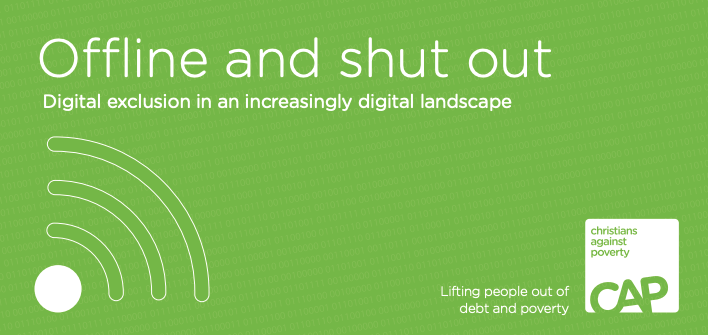Universal Credit: the welfare reform pushing people into hardship
Posted on 14 Feb 2019 Categories: Blog, Social Security
by Rachel Gregory

Universal Credit is hailed as the biggest welfare reform since the welfare state was introduced. While support exists for the principles behind its introduction – simplifying the legacy benefits system, reducing error and helping to make work pay – elements of the rollout and how it works in practice are still causing claimants hardship. Currently 1 million people are receiving Universal Credit and 7 million more are still to transition. Recently Amber Rudd, Secretary of State for the Department of Work and Pensions, announced that the rollout would be postponed, acknowledging that foodbank usage in areas where Universal Credit had been rolled out was increasing.
The speed of the rollout, delays in making payments, deductions for debt, digital requirements and famously the six-week wait have all been heavily criticised. The government has made some changes in response, including increasing advance payments to 100 per cent of the expected payment and reducing the six-week wait to five weeks, which will bring some welcome relief and help smooth the transition to Universal Credit for many people. However, issues still remain within the system design that need further attention, leaving people like Paul (names have been changed for the sake of anonymity) on the brink of the poverty line.
‘I did have debts before I came across to Universal Credit but it doesn’t help when the system, either by design or by accident, leaves you just on the nick of the poverty line constantly. It just compounds everything.’ – Paul
Christians Against Poverty (CAP), a national debt counselling charity, has recently released a series of briefing papers highlighting some of the key issues with Universal Credit, using case studies and findings from semi-structured interviews. The papers explore why applying for and living on Universal Credit is a challenge for those without digital access and those in debt, among others.
Digital exclusion
One of the biggest challenges for claimants is that you must use an online journal both for applying for Universal Credit and for tracking the claim, and this requires internet access. In an age where things have become digital by default, those without access to the internet or who struggle with computer illiteracy face continual detriment. As recounted in an earlier CAP briefing paper, Offline and shut out, as many as one in five CAP clients are digitally excluded, not having access to the internet at home or on a smartphone. In the briefing paper Applying and waiting for Universal Credit Daniel describes his experience.
‘I had to go back and forth to the job centre because they kept asking for different documents. I had to take all the paperwork in: the bank account, birth certificate, and then the very last straw was they said have you got the lease for your flat … I had to go back home and take it back in.’ – Daniel
Claimants without internet access at home are forced to visit public places such as libraries or the local Jobcentre Plus in order to submit and track their claim. The application form for Universal Credit is lengthy, so having to complete it in a public place can be stressful. Often the information needed is confidential in nature and many claimants feel pressured by having to input this information in a public space. Claimants can also be unclear what information will be needed, which can disrupt the application process. So, while a library or public space can act as a work around for those who cannot access the internet at home, it is by no means an easy solution.
Living and working on Universal Credit
Once claimants are successfully receiving Universal Credit, problems continue to arise. Many find that the benefits payments are simply not enough, especially where there are deductions for debt or advance repayments. Sadly, as a 2018 report from the Trussell Trust shows, the number of people using food banks has increased disproportionately in areas where Universal Credit has been rolled out.
‘Being on Universal Credit has been constant poverty. It’s always right down to the bone, in various ways … even though I’ve only got very small bills, £9 a month phone, I don’t have internet, I don’t have Sky, anything like that, but I’m still living hand to mouth … I try not to go [to the food bank] when I don’t have to, but I’ve always been using the food bank while I’ve been on this benefit.’ – Leanne
Budgeting is also a challenge for some. Universal Credit is paid monthly and many claimants have been used to being paid weekly or fortnightly, so they may struggle to make the money last the month. CAP would like to see more flexible payment schedules, welcoming the announcement that the Jobcentre Plus will, in some areas, pilot an option for more frequent payments, helping those who struggle to make their money last the month. While Personal Budgeting Support is offered by Universal Credit, it has had a limited impact due to low take-up and advisers not being able to take claimants’ full situation into account. However, there is still the broader challenge for many that payments, despite budgeting, are simply not enough to last the month.
Debt
Increasing people’s struggles to get by on a low income, the treatment of debts for those on Universal Credit places additional strain on claimants. The system, which deducts income at source for debts such as benefit overpayments or advance payments – an advanced payment is a loan to help tide claimants over for the five weeks until their first payment is made – leaves claimants facing real hardship. Under Universal Credit up to 40 per cent of a claimant’s Standard Allowance can be deducted. This can quickly mean that deductions become unaffordable, causing hardship and exacerbating financial difficulty, and the rigidity in the system makes is difficult to renegotiate lower repayments. Although the government has made plans to reduce deductions from 40 per cent to 30 per cent, this measure will not come into force quickly enough and 30 per cent still represents a significant proportion of someone’s income.
‘If you can’t afford £30 why can’t they just accept £20? Because in a few weeks’ extra they’d have paid it off already. It’s taking that extra £5 or £2 off people. It would pay for an extra day’s shopping.’ – Liam
Within debt advice generally, or when creditors use an income and expenditure model, repayments for most other debts are worked out on the basis of affordability, taking account of a person’s income and expenditure, yet repayments for benefit overpayments or advances are inflexible. Anyone would struggle if 30 per cent of their income was deducted and for those living off a low income, this leaves very little wriggle room for household bills and daily costs.
There needs to be a more flexible approach to debt collection. While large deductions may help to clear public sector debts quickly, they often cause more issues downstream. Claimants are left unable to afford their basic living costs, and more debt is accrued elsewhere.
Where next?
While CAP supports the principle of Universal Credit, the rollout and how it works in practice has continued to cause detriment for claimants. CAP would like to see the government urgently bring in more flexibility, reduced deductions and improved accessibility before the rollout continues to prevent more families falling into hardship. To read more about this topic, go to CAP’s website.
Rachel Gregory is Social Policy Manager at Christians Against Poverty.
Want to keep up-to-date with more articles like this? Sign up to our newsletter.
Posted on 14 Feb 2019 Categories: Blog, Social Security


What an absolute joke universal credit is I have been assessed and now get esa which doesn’t make much of a difference really I have to pay £60 a month from my universal credit towards my rent by the time I pay my monthly Bill’s I’m left with £22 pounds a week to live on absolutely atrocious how you are treat your definitely worse off , my husband passed away 9 weeks ago I suffer with anxiety and depression this situation is making me feel worse your just surviving not living just another statistic a number that’s all you are really and universal credit dont give a monkey’s how you have to live if that’s what you call it definitely worse off with out a doubt